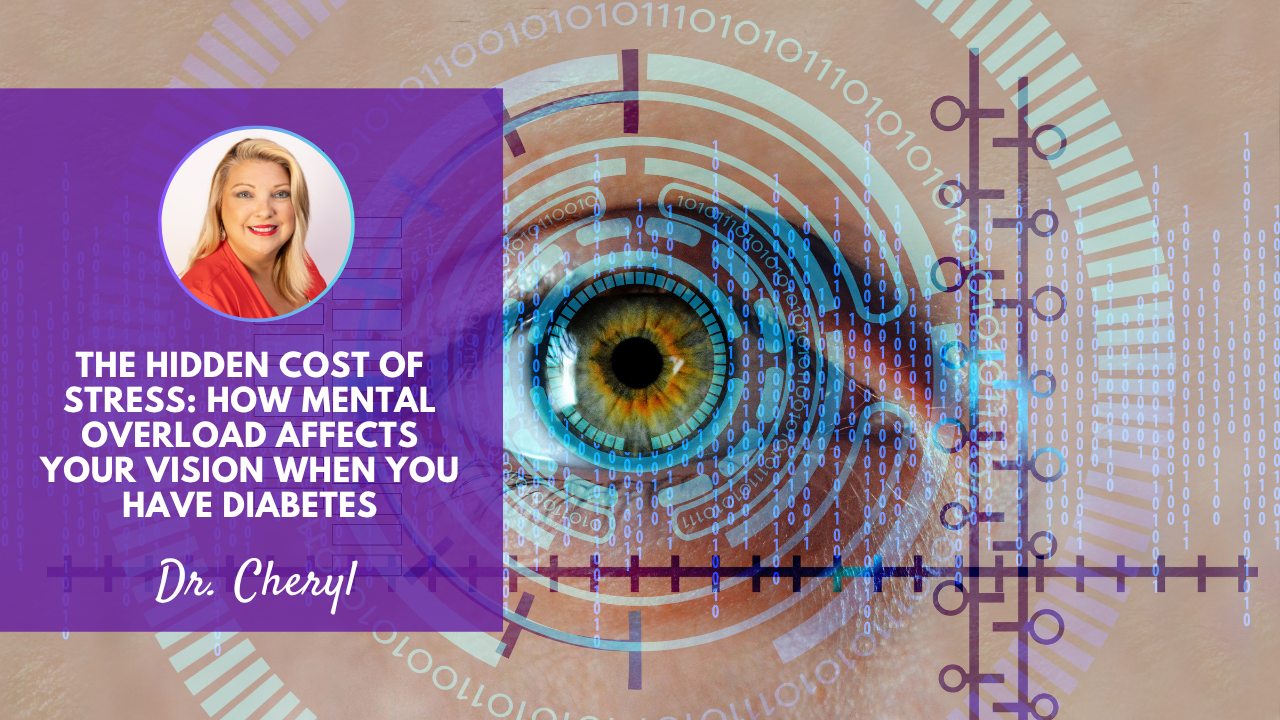
The Hidden Cost of Stress: How Mental Overload Affects Your Vision When You Have Diabetes
Sometimes your body shows you what your mind has been carrying. If you’re living with diabetes, you probably already know how food and movement affect your blood sugar. But what often goes unnoticed is how much your thoughts, emotions, and mental habits impact your health, especially your vision.
Stress doesn’t just live in your head. It ripples through your entire body. When stress becomes constant, blood sugar often follows. Over time, your eyes may suffer the consequences. This doesn’t happen overnight. It builds quietly when mental stress is left unchecked, becoming one of the hidden contributors to many diabetes complications including damage to your eyes.
The encouraging news is that you have tools to interrupt this cycle. By caring for your mindset and managing stress, you can protect your blood sugar, strengthen your resilience, and lower your risk of diabetic eye complications. In this article, you’ll learn how stress affects your eyes, what the research shows, and three practical mindset shifts that can support your vision and your overall health.
How Stress Impacts Both Blood Sugar and Eye Health
When your mind is overwhelmed, your body enters a reactive state. Hormones like cortisol and adrenaline surge, triggering your fight-or-flight response. While this reaction helps in emergencies, it becomes harmful when stress is chronic.
Long-term stress keeps blood sugar levels elevated. High blood sugar damages the smallest blood vessels in your body, especially those in your eyes. This damage can lead to diabetic retinopathy, a condition caused by weakened capillaries in the retina. Left unmanaged, it can cause vision changes or even permanent vision loss.
Stress often speeds up this process silently. That’s why stress management isn’t just about mental wellness. It’s a direct investment in long-term eye health.
What the Research Shows
-
A study in the Journal of Diabetes Research found that stress management techniques improved blood sugar outcomes.
-
Another study linked psychological stress to faster progression of diabetic retinopathy in people with type 2 diabetes.
The science is clear: chronic stress increases A1C levels, raises blood sugar variability, and speeds up complications like diabetic eye disease. Your mental state affects your vision more than most people realize.
Three Mindset Shifts That Support Eye Health
1. Begin Your Day with Calm, Not Chaos
Spend the first 5–10 minutes of your day in stillness. Skip your inbox and to-do list. Instead, sit quietly, take slow breaths, listen to a calming meditation, or sip your morning water with lemon. A gentle start helps regulate your nervous system, supporting steadier blood sugar and clearer vision.
2. Let Go of the “Everything Is Urgent” Mentality
Not every task requires your immediate attention. When you feel pulled in many directions, pause and ask yourself: What truly matters today? Giving yourself permission to slow down lowers mental pressure and allows your body to return to balance — a key to protecting both your eyes and your glucose levels.
3. Protect One Time Block from Interruption
Choose one daily moment - lunch, a short walk, or your evening wind-down - and protect it like your health depends on it. This non-negotiable time signals safety to your nervous system and helps lower your physiological stress response. That consistency stabilizes stress hormones, blood sugar, and circulation to your eyes.
Your Mindset Does More Than Support Your Mood
Paying attention to your inner world is one of the most powerful ways to protect your vision. You’re not powerless in the face of stress. By creating daily routines and thought patterns that support balance, you’re building resilience that benefits both your mind and your body.
It’s the little things that matter most:
-
How you start your day
-
How you respond to pressure
-
How you protect your quiet time
Together, these small choices form a system of care that shields your eyesight from the inside out.
Want to go deeper?
Read this next: Breaking Free from Negative Thought Patterns: A Holistic Approach When You Are Living with Diabetes
It’s a simple, empowering way to recognize and reframe the thought patterns that may be silently influencing your blood sugar, and your sight.
Frequently Asked Questions
Can stress really cause diabetic eye problems?
Yes. Chronic stress raises blood sugar and damages small eye vessels, increasing the risk of diabetic retinopathy.
What are simple daily stress management tools for eye health?
Breathing exercises, meditation, journaling, and daily quiet time all lower stress hormones and support circulation to the eyes.
How quickly does stress affect blood sugar?
Stress hormones like cortisol and adrenaline can raise blood sugar within minutes. When stress is chronic, this effect becomes ongoing and harmful.
Does lowering stress improve vision?
Lowering stress doesn’t reverse existing eye damage, but it helps stabilize blood sugar and slows down the progression of diabetic eye disease.
Let’s Take Care of Your Whole Self, Eyes Included
Living a healthy, empowered life with diabetes means staying ahead of complications, not waiting for symptoms to sound the alarm. You don’t have to navigate this alone.
Book your complimentary Diabetes Wellness Connection Call today. In just one conversation, we’ll explore what matters most to you, where you feel stuck, and which proven next steps can help you manage your blood sugar more effectively, mentally and physically.
Even if your schedule is packed and responsibilities are heavy, your nervous system deserves a reset. Because when stress is constant, it affects more than your mood. It impacts your blood sugar, your tissues, your energy, and your vision.
Your clarity matters. Your focus matters. Let’s start protecting both today.
Living a healthy, empowered life with diabetes means staying ahead of complications, not waiting for symptoms to sound the alarm.
You don’t have to navigate this alone.
ABOUT THE AUTHOR

Dr. Cheryl
Dr. Ac., C.H., RDH
Dr. Holistic Studies, Dr. Acupuncture
Diabetes Wellness Strategist & Coach
Creator & CEO of Holistic Diabetes Solutions
8 X International Best-Selling Author
As a woman living with diabetes for over 30 years, Dr. Cheryl understands the journey firsthand. When she was diagnosed, she received the same outdated advice her grandmother was given for over four decades, who relied primarily on medication, suffered from deteriorating health and eventually lost her life to diabetes. Fueled by this experience, Dr. Cheryl was compelled to seek a better way. Through countless research studies and trials, she developed the winning holistic approach: the Diabetes Success System which merges traditional wisdom with today’s best holistic self-care practices. It has revolutionized diabetes management by providing a trusted way to maintain consistent and predictable healthy blood sugar levels.
_______________________
PROFESSIONAL DISCLAIMER
The material and content contained in this platform is for overall general diabetes health and education information only. It is not intended to constitute medical advice or to be a substitution for professional medical recommendations, diagnosis or treatment. All specific medical questions or changes you make to your medication and/or lifestyle should be discussed and addressed with your primary healthcare provider. Having the right mindset, doing the right movements at the right times of day, and eating foods that help keep blood sugar, insulin, and inflammation manageable can dramatically reduce your risk of the all-too-common complications of Diabetes, increase your energy levels and have you feeling your best every day.






